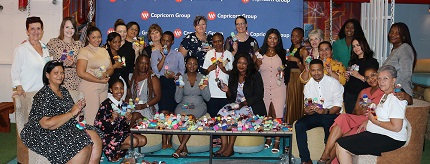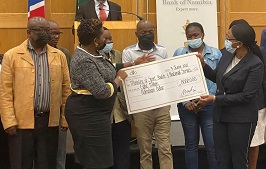
Amos Meerkat teaches kiddies moral values with handmade soft dolls

The Amos Meerkat Syllabus (AMS), a project supported by the Capricorn Foundation focusing on early childhood development, received a donation of 250 dolls that were handmade by Capricorn employees.
The AMS project requires thousands of these dolls annually for educational purposes at preschool centres and collects dolls throughout the year from willing donors. The dolls are used as tools for moral teachings and to train young children to recognise and speak out against abuse.
“We are proud of our employees in their role as Changemakers for taking time during their holiday and using their resources to make a difference in a child’s life. Through the Changemaker programme, our employee volunteerism embodies the Group’s purpose of being Connectors of Positive Change,” said Group Executive for Brand and Corporate Affairs, Marlize Horn.
The educational dolls are only 11 cm high, so children can easily put them in the tiny palms of their hands to remind them of how precious they are in the sight of their creator, God. The dolls can easily be carried and tucked in their pockets. The knitted dolls are durable and can last a long time.
“I know that every stitch was made with love, and every child receiving a doll will feel very special. We want to ensure that every child at our Early Childhood Development centres has a doll; therefore, we will continue to collect them. These miniature dolls have become a symbol of belonging and education for children in informal settlements, and an opportunity to teach values, and morals, and equip children to be aware of abuse,” Alet van der Merwe, National Coordinator of the Amos Meerkat Syllabus project.
The Amos Meerkat Syllabus aims to equip existing non-governmental preschools in farms and farming communities in Namibia that do not have a curriculum or whose current curriculum is not appropriate for their circumstances with an updated curriculum to ensure that the learners would be educationally ready for Grade 1.
Due to remote areas, long distances, no teaching materials, lack of knowledge, and lack of appropriate means of travel, there are a lot of pre-scholars (5 and 6-year-olds) that do not have the opportunity to attend a facility that can assist them to be school ready and ultimately be able to contribute as citizens to the economy of Namibia. This is a very focused and unique need that AMS is attending to, reaching 5000 preschool children every year across the country from Lüderitz in the south to Katima Mulilo in the far north.










































